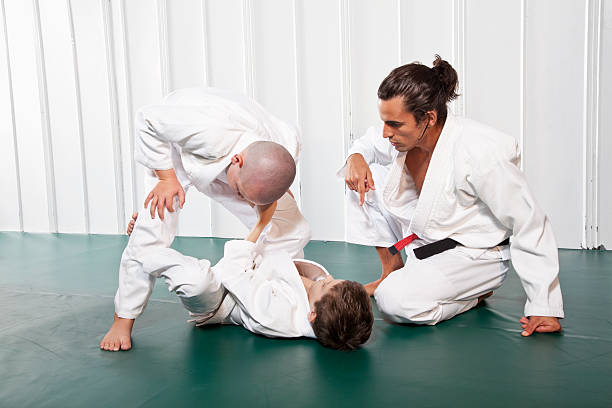We had the pleasure of taking a team of people to the GBJ (Great Britain Jujitsu) Nationals last week, and we were asked the same question quite a few times, so we look further into the questions from a parenting perspective.
BJJ: Perspective
As a professional, it’s important to answer in a clear and precise way, ensuring that each answer was specific to their particular child.
Why are parents asking this? What difference does it make?
So, before addressing this question, as a parent and a BJJ/Japanese Jujitsu coach, I believe this can be addressed correctly.
Why Are Parents Asking This?
After all, most children (particularly boys) have played for a football team, but not one parent will ask the coach before the match ”What if they lose?”. Is this down to accountability? If the team lose, it’s quite literally ‘the team’ and not the individual.
In Jiujitsu, it’s on you. You are accountable, and perhaps that puts additional pressure on the fighter? Maybe the real question that parents are asking is ‘What if they get hurt?’, which would make sense, but it’s a contact sport. Surely parents expect there to be an injury at some point? Of course, this doesn’t stop the worry, but if it’s something the kids want to do, accept the risks.
It would seem parents ask, more so out of fear or anxiety for their child. 95% of the population wouldn’t get on the mats, so their anxiety is spewed over on behalf of their children. This is why anyone who gets on the mat should be commended. It takes a bottle to stand in front of a crowd, it takes a bottle to stand in front of a crowd you don’t know, and it takes even more of a bottle to compete against someone.
That’s courageous, and the kids should be praised for just getting onto the mats in the first place.
What Difference Does It Make?
This is the biggest question of all. What difference does losing make? This is almost immediately the point in Jiujitsu! If you lose, it doesn’t matter, simple. There’s an old expression in Jiujitsu, which should be taught from an early age.
”if you’re not winning, you’re learning”
You may learn the valuable lesson that you aren’t that good or to not keep one arm in when escaping guard. Maybe you need to get tighter to your opponents? Perhaps it’s, ‘I know that escape and I messed it up.’ Maybe it’s the realisation that you did everything right and that some people are just better. Whatever the takeaway is, use it to your advantage.
Kids have many years left in this game, and we live in a society where they get participation medals. Jiujitsu stops that. There has to be a winner, and subsequently, there must be a loser too. Subjecting the child to ‘micro losses’ sets them up to help them deal with bigger ones. They will also learn that THEY are the ones who are ultimately accountable for their actions, but when it hits the fan, they have a team, a support unit, right behind them. They’ll learn how to ask for help, and others will learn how to give help. The coach will address the weaknesses, and the kid will have to address them. All of these skills will be acquired, all stemming from a loss.
Final Thoughts
Losing is part of life. Learning how to lose is very important. In a world where mental health is a high priority, learning how to lose at a young age will almost certainly put the kid in good stead moving forward. When they say that Martial arts is a life skill, it’s not a life skill like swimming or riding a bike – i.e. once you know, you know. It’s a life skill because it teaches you how to persevere. It teaches you how to motivate yourself, and most importantly, it teaches you how to lose and how to deal with that loss.
I’ve learned that gender, age, and size have nothing to do with one’s ability to fight. The smallest people can be the hardest, and the biggest can be the softest. Sometimes world champs lose, and ‘unknowns’ win. So if I was to give any parenting advice, let the children lose.
Follow me on Twitter @ads_jujitsu_bjj, and for more UK Combat Sports news and discussions make sure to follow Combat Sports UK.
Featured image credits to Embed from Getty Images















